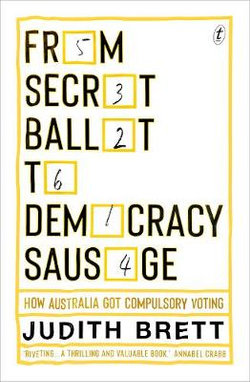Alone among English-speaking democracies, Australia compels its citizens to vote...
It forces politicians to consider the impact of their policies on all groups of Australians, especially the disadvantaged and marginalised, and so contributes to a more equal and just society.
It's compulsory to vote in Australia. We are one of a handful of countries in the world that enforce this rule at election time, and the only English-speaking country that makes its citizens vote. Not only that, we embrace it. We celebrate compulsory voting with barbeques and cake stalls at polling stations, and election parties that spill over into Sunday morning.
- But how did this come to be?
- When and why did we begin making Australians vote?
- What effect has it had on our political parties, our voting systems, our participation in elections?
- And how else is the way we vote different from other English-speaking democracies?
From Secret Ballot to Democracy Sausage is a brilliant essay-length book by the celebrated historian Judith Brett, the prize-winning biographer of Alfred Deakin. This is a landmark account of the character of Australian democracy.




Share This Book: